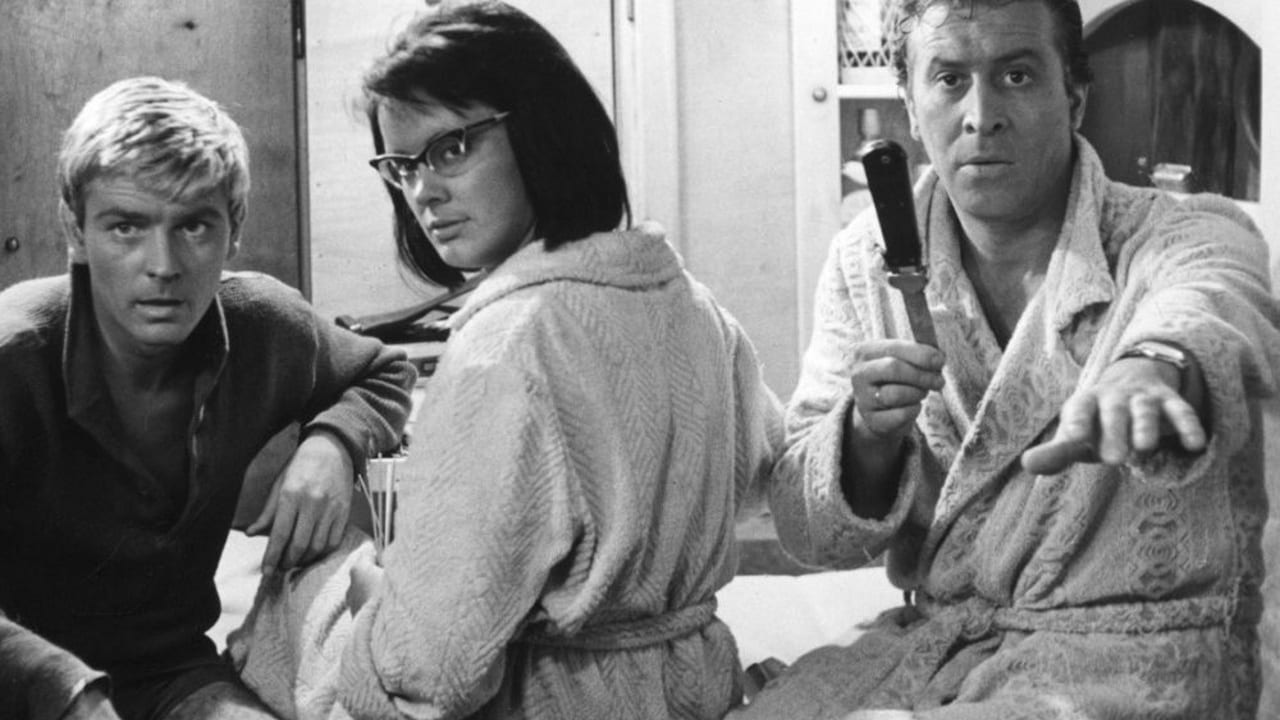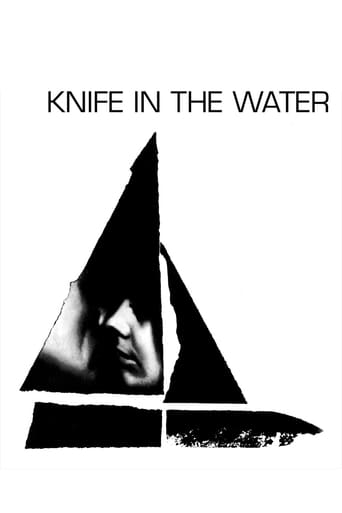WasAnnon
Slow pace in the most part of the movie.
Matialth
Good concept, poorly executed.
Huievest
Instead, you get a movie that's enjoyable enough, but leaves you feeling like it could have been much, much more.
Chirphymium
It's entirely possible that sending the audience out feeling lousy was intentional
CinemaClown
Roman Polanski's feature film debut is a competently crafted, patiently narrated & finely performed thriller that finds the then-new filmmaker showcasing his firm grip on the storytelling elements as he manages to carve out some tense moments from its simple premise & minimal setting.The story of Knife in the Water follows a middle-aged couple who, while on their way to a sailing trip, encounter a young hitchhiker and invite him along. As the day progresses, tension increases between the two men as they both start vying for the attention of the same woman.Co-written & directed by Roman Polanski (best known for Rosemary's Baby & The Pianist), the majority of Knife in the Water takes place aboard a yacht and is solely focused on its characters, whose arcs are well-written and the rivalry & sexual tension between them is what drives this tale.Camera is manoeuvred in an atypical fashion, employing unconventional angles & close-ups to provide some really interesting shots which in turn complements its black & white photography while sound & score also play their role in creating an atmosphere that brims with uncertainty.Coming to the performances, there are only three cast members in the film, two playing the ageing couple & third being the hitchhiker who goes sailing with them. Each one of them gets sufficient time on screen and they all play their part wisely. Chemistry between the three is even better and it only gets better as plot progresses.On an overall scale, Knife in the Water is a splendid start to Polanski's feature filmmaking career and is a fine exhibition of his innate cinematic knowledge. However, despite getting many things right, it still left me indifferent & cold, for I didn't care much about the characters' fate nor found the premise as compelling as I expected. Experimental & intriguing, Knife in the Water is nonetheless worth a shot.
Christopher Culver
Released in 1962, KNIFE IN THE WATER (Polish: Nóz w wodzie) was director Roman Polanski's full-length debut. Married couple Andrzej (Leon Niemczyk) and Krystyna (Jolanta Umecka) are driving to the marina when they pick up a hitchhiker (Zygmunt Malanowicz). Though Andrzej is initially angry at the young man for standing the middle of the road, he invites him to come sailing. Once on the boat, tension arises between the two men because of Krystyna sexual appeal and the hitchhiker's poverty versus Andrzej's affluence. Not only is the title a metaphor for the boat as it moves through the lake, but it also refers to the intimidating knife that the young man carries with him.KNIFE IN THE WATER is entertaining enough. The cinematography on the lake and the low-key soundtrack by jazz legend Krzysztof Komeda are memorable. But personally I don't find this to be an especially great film. It feels derivative of Italian cinema of the time, without an original touch. The casting of the weathered, 32 year-old Malanowicz as a 19 year-old student undermines its credibility. I suspect that the film gained so much attention on release due to its risqué nature (especially novel in a film from the Eastern Bloc) instead of its intrinsic merit.
disinterested_spectator
According to Chekhov, if you make people aware of a gun early on in a story, sooner or later someone in the story will have to shoot the gun. If the gun is not going to be fired, it should not be in the story. Now, knives are more common than guns, and are used for mundane purposes, such as cutting the meat on one's plate, so the rule that applies to guns cannot automatically be applied to knives. Unless, that is, it is a wicked-looking, gravity-propelled, telescoping knife with a four-inch, locking blade. When you put a knife like that in a story, then Chekhov's law applies to that weapon as well, and it is required that someone get cut with it.But no one does. Not only is this knife referred to in the title, but it is introduced early on and emphasized again and again. The tension is built up as the knife is used to play a dangerous game of stabbing between the fingers of a spread out hand. It is used again when it is several times thrown across the cabin and into the wall. And it is used to cut the halyard when the sailboat runs aground. This would be like having a gun in a movie, with people showing off their marksmanship or using it for some ordinary practical end. It would not satisfy our need to see the gun used for a more deadly purpose, just as these various employments of the knife do not satisfy our expectation that someone will be stabbed with it. But no one is.Finally, Andrzej takes the young man's knife and throws it in the water. The idea is that the young man was very fond of his knife, and Andrzej threw it in the water out of spite. But in that case, the object might just as well have been a harmonica that the young man was fond of. As it is, the fact that no one got stabbed after all the emphasis placed on the knife leaves us disappointed. Roman Polanski, who directed this movie, must have eventually figured this out, which is why Jack Nicholson got his nose sliced in "Chinatown."
Pierre Radulescu
I firstly saw Nóz w Wodzie sometime in the sixties. Throughout the years I forgot some details of the plot, while I kept the essential. I remained with the impression of one of the greatest movies ever. I watched many other of Polanski's works, none of them has succeeded to replace this one in my soul. Many of his movies are great, this one is unique. By the purity of his minimalism? Maybe. You see, his other works started from very generous stories, offering full potential to create great movies. This one has practically no story. A couple is driving their car toward a lake for two days of sailing, a hitch-hiker appears as of nowhere, they invite him to join, their stay on the boat is tensioned by obscure conflicting impulses, a fight takes place, the unknown guy leaves toward nowhere. Drowned (as the male believes)? Alive (as the female knows)? Or is it just the woman imagination? After many years I encountered the movies of Kim Ki-Duk. 3-Iron made Nóz w Wodzie come to my mind. It seemed to me that both movies were sailing on the same waters. I related 3-Iron to Nóz w Wodzie, and then I related all Kim Ki-Duk films to 3-Iron. They are exploring two universes: ours, where what matters is a good job, a good car, a good house, a good marriage (to be read a spectacular wife), and the other universe, where everything is just absurd (by our standards). The hitch-hiker in the movie of Polanski, the drifter in the movie of Kim Ki-Duk, are just visitors: our reaction is of open hostility (if we are the subjects in our world), sometimes of obscure attraction (if we are rather the objects, dreaming escapes). Hostile or attracted to them, it happens the same: they remain just visitors, we'll never know anything about them.

